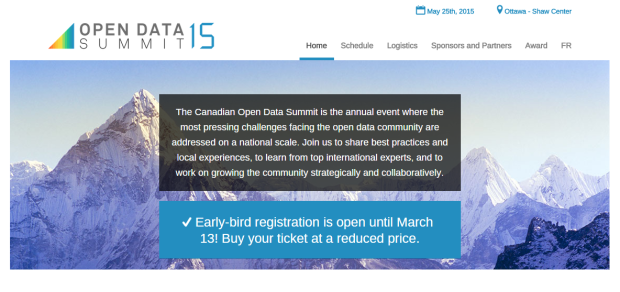Save the date!
The University of Ottawa Library, with sponsorship from the Carleton University Library, is organizing a one-day conference, Government Information Day, scheduled to take place on Thursday, October 16th, 2014 at the University of Ottawa’s downtown campus.
Last year, Government Information Day was held at the University of Toronto and we would like to continue last year’s valuable discussion. We are currently in the process of developing the program. The broad theme will be focused around collaboration, with presentations and panels organized around two proposed subthemes: (i) preservation and access and (ii) open government.
Government Information Day is designed as a forum for keeping current on ongoing changes, but also for exploring how we can collaborate and respond to emerging and ongoing challenges and opportunities in the field of government information in Canada.
Stay tuned for more details and registration information.
If you have any questions, please, feel free to get in touch with us at gsg@uottawa.ca.

Marquez votre calendrier!
Organisée par la Bibliothèque de l’Université d’Ottawa, sous le patronage de la Bibliothèque de l’Université Carleton, la Journée d’information gouvernementale est une conférence d’une journée qui aura lieu le jeudi 16 octobre 2014 au campus principal de l’Université d’Ottawa.
L’an dernier, la Journée d’information gouvernementale a eu lieu à l’Université de Toronto et nous aimerions poursuivre la discussion entamée. Nous sommes à présent en voie d’élaborer le programme de la Journée. Le thème général sera axée sur la collaboration, et comprendra des présentations et des tables rondes structurées autour des deux sous-thèmes proposés: (i) la préservation et l’accès et (ii) la transparence gouvernementale.
La Journée d’information gouvernementale, est non seulement conçue comme une instance ouverte pour permettre de rester à l’affût des changements en cours, mais aussi pour examiner les façons de collaborer et de répondre aux défis et aux occasions qui se posent dans le domaine de l’information gouvernementale au Canada.
Des détails supplémentaires et de l’information relative à l’inscription seront bientôt disponibles.
Si vous avez des questions, n’hésitez pas à nous les faire parvenir à gsg@uottawa.ca.





 En quoi consiste le dialogue en matière d’idées? Il s’agit d’un moyen de passer à l’étape suivante dans l’élaboration du Plan d’action du Canada pour un gouvernement ouvert 2.0. Nous aimerions connaître vos idées sur la façon dont le gouvernement du Canada pourrait orienter ses efforts en vue d’accroître son ouverture et sa transparence. Vous pourriez également enrichir l’idée d’une autre personne en ajoutant vos commentaires aux pages de discussion relatives aux détails de l’idée en question.
En quoi consiste le dialogue en matière d’idées? Il s’agit d’un moyen de passer à l’étape suivante dans l’élaboration du Plan d’action du Canada pour un gouvernement ouvert 2.0. Nous aimerions connaître vos idées sur la façon dont le gouvernement du Canada pourrait orienter ses efforts en vue d’accroître son ouverture et sa transparence. Vous pourriez également enrichir l’idée d’une autre personne en ajoutant vos commentaires aux pages de discussion relatives aux détails de l’idée en question.